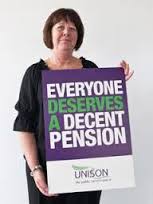Pensions - Have You Planned to Retire?
Saturday 18 March, 2017 Written by Dave Watson
Pensions are undergoing some radical changes. Many more workers are accessing pension schemes through auto-enrolment, even if the adequacy of many of these schemes is poor. Good quality Defined Benefit (DB) – where you know what you put in and what you’ll get out – schemes are being replaced by often poor quality Defined Contribution (DC) – where you only know what you’ll put in, not what you’ll get out.
DC schemes shift the investment risk from employers to workers, who are ill prepared to understand or take those risks. The UK Government has just published a Green Paper on Defined Benefit schemes. Perhaps surprisingly, it paints a more positive picture than you might expect. It confirms that there is no general affordability crisis in pensions and the system for protecting scheme members’ benefits is working broadly as intended.
Some 11 million people have entitlements to private sector DB pensions and many more are in public sector schemes.
Therefore we need to think more about nurturing the schemes that remain, applying some of their strongest elements to other parts of the pensions system, and less about declaring them obsolete. The UK Government could help by changing the rules that overestimate liabilities. A
After the BHS scandal, scheme members should also get priority over shareholder dividends. One major problem with pension investments in the UK is fees, as highlighted in a recent report by the Financial Conduct Authority (FCA). The UK’s asset management industry manages £6.9 trillion of assets for individuals and pension funds.
More than three quarters of UK households with occupational or personal pensions use these services, including over 10.2 million saving for retirement through pension schemes. Very few of us are not touched by this industry, although most will probably have never heard of it. More importantly, they will have little idea how much of their hard-earned cash goes to the industry.

The FCA report states that asset management firms take an average profit margin of 36 per cent. These margins are even higher if the profit sharing element of staff remuneration is included. The saying “we are in the wrong job” has a whole new meaning! Poor quality and expensive occupational and personal pension schemes mean the gap between the state pension and what most people need for a comfortable retirement is around £10,000 a year – the equivalent of a £250k pension pot. To put this in context, the average local government pension in payment is £3,750 a year – and that’s one of the better schemes.
These problems are even greater for women. Only 52 per cent of women are adequately saving for retirement in comparison to 60 per cent of men and as a consequence their income is only 85 per cent of male counterparts. Yet women account for 61 per cent of pensioners and more than two-thirds of pensioners living in poverty are women. The problem for women is that their lives do not mirror those of men. For example, half end pension contributions at childbirth.
So-called pensions liberation is creating huge opportunities for fraud, but for women it is often being used to clear problem debts. Auto-enrolment has brought more women into pensions, but the low pay threshold and rules on aggregating employment has hit women harder than men.
But don’t worry, most of us at least qualify for the state retirement pension. Many will have heard about the new flat rate pension of £155 per week. Fewer will know half of Scots probably won’t qualify for it. Again, women are being hit hard by the failure to fairly transition women in their fifties to the new arrangements. The lengthening state retirement age means we will also have to wait longer to receive it.
The number of Scots working past retirement age has almost doubled since 2004 – many out of necessity rather than choice. The UK government commissioned John Cridland to look at this and he was told life expectancy in Scotland is 1.3 years shorter than the rest of the UK, so the state pension age should be lower.
But we should remember that differences in life expectancy within Scotland are much greater than the differential with the rest of the UK. Inequality remains the main cause of a shorter life.
Pensions are complicated and financial planning can be a minefield. However, there is advice out there. Everyone should track down their occupational pensions and go to the government website to work out their state pension entitlement. We protect the best quality pension schemes and bring the poor ones up to a better standard.
Government needs to crack down on those who are ripping us off with better regulation. After 40-50 years of work, we are all entitled to a comfortable retirement.
Article courtesy of Dave Watson, who is Head of Policy and Public Affairs at UNISON Scotland and Editor of Pensions Scotland, www.pensionsscotland.org This article was written for: The Scotsman.
Leave a comment
Make sure you enter all the required information, indicated by an asterisk (*). HTML code is not allowed.
Join
FREE
Here











